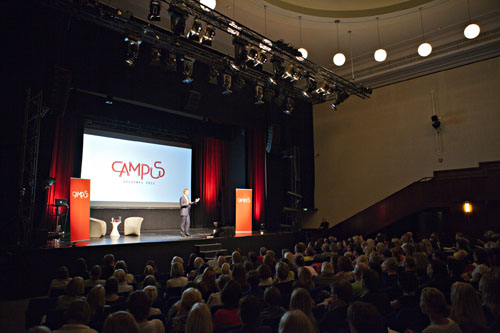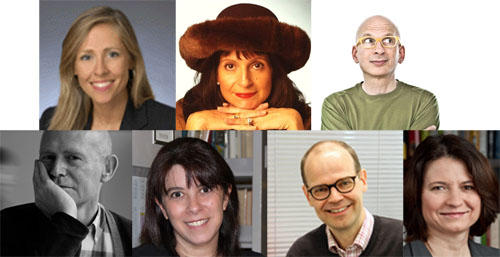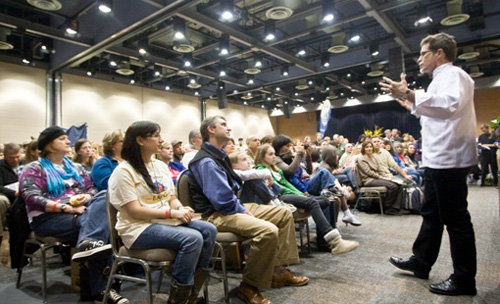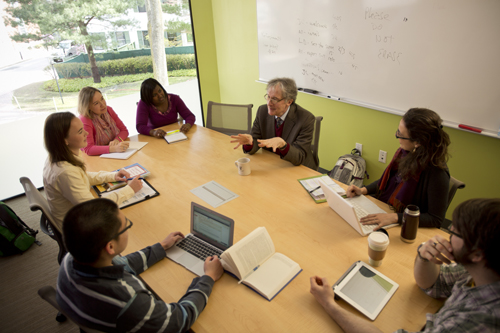
“קַמפּוּס,” רעיון נולד בפינלנד (המדינה דירוג הדף בחינוך על פי השוואות בינלאומיות האחרונות), הוא סמינר מקצועי בלעדי לכל המורים בבתי הספר ציבוריים בניו יורק שיתקיימו בשבת קרובה, May 4th at Sunshine Cinema in New York, in cooperation with the NYC Department of Education. The aim is to allow experts on a diverse range of topics, ממדעי המוח להפרעות אכילה לבריונות ברשת, to share perspectives with educators on recent developments in those spheres.
“What is School For? The Power of the Heroic Teacher,” will be the keynote speech by blogger and best selling author Seth Godin. Other speakers include Gary Carter, DR. Eero Castren, DR. אליזבת אנגלנדר, DR. Andrea Vazzana and Kathy Bostjancic. I was able to catch up with them to talk about some of the topics they will be addressing.
Seth, what makes a heroic teacher?
Seth: Heroism is about taking risks. Sometimes it’s the existential risk of running into a fire but more often than not it’s the vulnerability that comes from going off the beaten path, from standing up for what you believe in and, יותר מהכל, for caring more than you should.
אליזבת, what makes cyber-bullying a major issue?
אליזבת: Communicating through digital means represents a major change for the human race. Unlike the advent of some other technologies, cyberspace literally changes the way people perceive and understand each other. But because it is so new, these subtleties aren’t well understood, and thus the impact of social cruelty that occurs digitally is still an area of intensive study. יְלָדִים, בפרט, often don’t understand how severely their digital words and their sharing of images can affect their peers (ואחרים), and thus the social problems caused by cyber-communications are far too frequent and can be very severe. For all its advantages, cyber-communication can also lead to serious problems, including depression, חרדה, problems with social skills, and difficulties in human relationships. Cyber-bullying is a major issue simply because it causes a great deal of grief and will not subside before it is better understood and before this knowledge is successfully transmitted to users.
Gary, do you believe our education system is doing enough for children with learning disabilities?
Gary: As I am neither an American, nor an educationalist, I am not qualified to comment on whether this education system does enough for children with learning disabilities. I am the parent of an adopted disabled child.
עם זאת, I am convinced that mainstream society in the Western world undervalues the lived experience of people with all kinds of disabilities, physical and developmental/learning. We assume that the experience of individuals with disabilities is somehow less than ours, or lacking, and as a result we tend not to focus on understanding, participating in, or enriching their experience of the world. We tend instead to move from a position of pity, to discussing the impact of non-mainstream children on parents and other (mainstream) בני משפחה, again usually in a context of the difficulties families experience in managing, dealing with or living with disabled members. This has a number of dangerous implications: it tends to make the whole family ‘about’ the disabled member, at the expense of other members of it, and at the same time it does little to enrich the life experience of the disabled individual or the other family members.
There is surprisingly little focus by professionals on the direct relationship or interface between mainstream family members and disabled family members, in an emotional sense and experiential sense, and even less on ensuring that disabled family members have a rich emotional and conceptual experience of the world. It’s as if we cannot imagine that a world that is experienced fundamentally differently to ours can be valuable, rich and inspiring.
Eero, how significant an impact can the neuroscience of learning have on what and how students are taught?
Eero: Many forms of learning take best place during sensitive periods in childhood and juvenile life. We have recently learned a great deal of new things about how learning can be promoted in adults, when the sensitive periods are closed, and about the neurobiological basis of this enhanced learning. Experiments performed in rodents demonstrate that certain commonly used drugs, such as the antidepressant Prozac, can promote learning by activating in adult brain a state similar to that present during sensitive periods of learning in juveniles. Drug treatment needs to be combined with a training program for any beneficial effects to become apparent. A similar plastic state can be activated by purely environmental changes, such as an enriched environment. It is currently unclear how these treatments might influence children still within the sensitive periods of learning, but these findings underlie the importance of a stimulating and supportive environment for optimal learning.
אנדריאה, how big of an issue is body image for students in the classroom?
אנדריאה: Awareness of one’s appearance begins during the preschool years. לצערנו, negative body image begins soon thereafter and increases with age, peaking in adolescence. Among grade school kids, most girls and nearly half of boys report body dissatisfaction. It’s estimated that by adolescence, one-third of girls engage in unhealthy weight-control practices (דהיינו, fasting, self-induced vomiting, diet pill/laxative use). Kids learn from parents, מורים, peers and the media to value thinness (for girls) and muscularity (for boys). Deviations from the ideal can result in decreased self-worth, even among normal weight individuals. בית הספר, where the preponderance of peer interactions occurs, is a prime setting for appearance-related conversations and comparisons. The school’s physical environment, as well as faculty’s role-modeling and direct comments, sometimes provides further inculcation of idealized appearance standards. The past decade has seen the development of school-based interventions that realign body image with realistic standards and protect students from otherwise deleterious effects.
Kathy, what should we be teaching students about the interconnectedness of global economies?
Kathy: לארה"ב. economy still remains the single largest in the world, and its influence remains great. עם זאת, the winds of economic power are shifting from the advanced economies to the emerging economies. ב 2000, the advanced economies, כולל ארה"ב, אירופה, and Japan, accounted for 60 percent of total world economic activity, while the emerging economies accounted for 40 אחוזים. Just a decade later in 2010, the split between advanced and emerging economies shifted to 50 אחוזים – 50 אחוזים. ב 2020, the emerging economies are projected to outpace the advanced economies, with the split moving to 60 אחוזים – 40 percent in favor of the emerging economies. And China is forecast to displace the U.S. as the largest economy. יתר על כן, the global economies and financial markets are becoming more and more interconnected. Given these global realities, it is critical that U.S. students view the U.S. economy and their own future within a global context.
For more information and registration: http://campusnyc.eventbrite.com


בגלובל החיפוש לחינוך, להצטרף אליי ולמנהיגי מחשבה מוכרת בעולם כולל סר מייקל ברבר (בריטניה), DR. מיכאל בלוק (ארה"ב), DR. ליאון בוטשטיין (ארה"ב), פרופסור קליי כריסטנסן (ארה"ב), DR. לינדה דרלינג-Hammond (ארה"ב), DR. Madhav אוון (הודו), פרופ 'מיכאל Fullan (קנדה), פרופ 'הווארד גרדנר (ארה"ב), פרופ 'אנדי הארגריבס (ארה"ב), פרופ 'איבון הלמן (הולנד), פרופ 'קריסטין Helstad (נורווגיה), ז'אן הנדריקסון (ארה"ב), פרופ 'רוז Hipkins (ניו זילנד), פרופ 'קורנליה הוגלנד (קנדה), הכבוד ג'ף ג'ונסון (קנדה), גברת. שנטל קאופמן (בלגיה), DR. Eija Kauppinen (פינלנד), מזכיר המדינה Tapio Kosunen (פינלנד), פרופ 'דומיניק לפונטיין (בלגיה), פרופ 'יו לאודר (בריטניה), פרופ 'בן לוין (קנדה), לורד קן מקדונלד (בריטניה), פרופ 'בארי McGaw (אוסטרליה), שיב נדאר (הודו), פרופ 'R. נטריגין (הודו), DR. PAK NG (סינגפור), DR. דניז אפיפיור (ארה"ב), שרידהר ךאג'גופלן (הודו), DR. דיאן ראוויטש (ארה"ב), ריצ'רד וילסון ריילי (ארה"ב), סר קן רובינסון (בריטניה), פרופ Pasi Sahlberg (פינלנד), אנדריאס שלייכר (PISA, OECD), DR. אנתוני סלדון (בריטניה), DR. דוד שפר (ארה"ב), DR. קירסטן Immersive Are (נורווגיה), קנצלר סטיבן ספאן (ארה"ב), איב Theze (Lycee Francais ארה"ב), פרופ 'צ'רלס Ungerleider (קנדה), פרופ 'טוני וגנר (ארה"ב), סר דייוויד ווטסון (בריטניה), פרופסור דילן Wiliam (בריטניה), DR. מארק Wormald (בריטניה), פרופ 'תיאו Wubbels (הולנד), פרופ 'מייקל יאנג (בריטניה), ופרופ 'Minxuan ג'אנג (סין) כפי שהם לחקור שאלות חינוך תמונה הגדולות שכל המדינות מתמודדות היום. גלובל החיפוש לחינוך עמוד קהילה
C. M. רובין הוא המחבר שתי סדרות מקוונות רבים קוראות שלהיא קיבלה 2011 הפרס אפטון סינקלר, “גלובל החיפוש לחינוך” ו “איך וויל אנחנו קראו?” היא גם מחברם של שלושה ספרים רבי מכר, כולל אליס בארץ הפלאות Real.





תגובות אחרונות